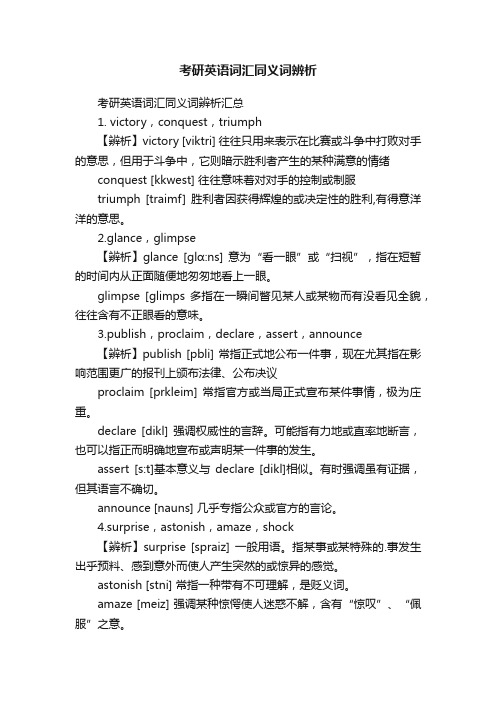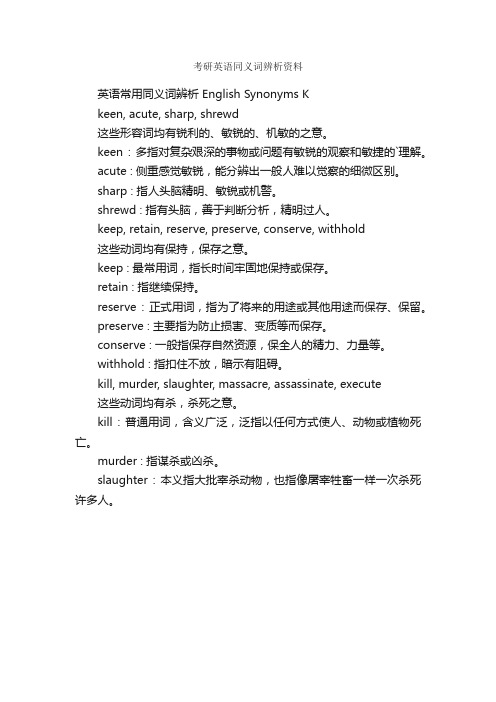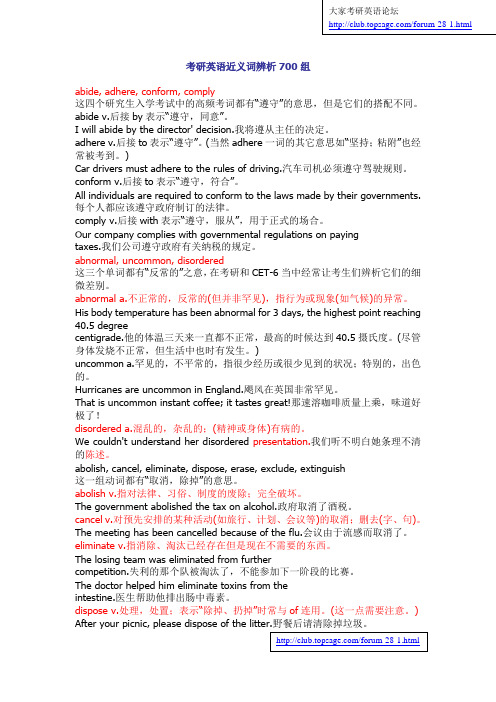石春祯考研英语同义词辨析
考研英语词汇同义词辨析

考研英语词汇同义词辨析考研英语词汇同义词辨析汇总1. victory,conquest,triumph【辨析】victory [viktri] 往往只用来表示在比赛或斗争中打败对手的意思,但用于斗争中,它则暗示胜利者产生的某种满意的情绪conquest [kkwest] 往往意味着对对手的控制或制服triumph [traimf] 胜利者因获得辉煌的或决定性的胜利,有得意洋洋的意思。
2.glance,glimpse【辨析】glance [ɡlɑ:ns] 意为“看一眼”或“扫视”,指在短暂的时间内从正面随便地匆匆地看上一眼。
glimpse [ɡlimps 多指在一瞬间瞥见某人或某物而有没看见全貌,往往含有不正眼看的意味。
3.publish,proclaim,declare,assert,announce【辨析】publish [pbli] 常指正式地公布一件事,现在尤其指在影响范围更广的报刊上颁布法律、公布决议proclaim [prkleim] 常指官方或当局正式宣布某件事情,极为庄重。
declare [dikl] 强调权威性的言辞。
可能指有力地或直率地断言,也可以指正而明确地宣布或声明某一件事的发生。
assert [s:t]基本意义与declare [dikl]相似。
有时强调虽有证据,但其语言不确切。
announce [nauns] 几乎专指公众或官方的言论。
4.surprise,astonish,amaze,shock【辨析】surprise [spraiz] 一般用语。
指某事或某特殊的.事发生出乎预料、感到意外而使人产生突然的或惊异的感觉。
astonish [stni] 常指一种带有不可理解,是贬义词。
amaze [meiz] 强调某种惊愕使人迷惑不解,含有“惊叹”、“佩服”之意。
shock [k] 本组内语气最为强烈。
含有对情感造成触动的意味。
5. remark, comment, review【辨析】remark [rimɑ:k] 意思是口头的评价,比较简单,而且不定客观的评价comment [kment] 是比较正式的评价,而且具有权威的感觉。
考研英语常用同义词辨析必读

最新考研英语常用同义词辨析必读Aabandon, desert, forsake, leave, give up这些动词或词组均含“抛弃、放弃”之意abandon :强调永远或完全放弃或抛弃人或事物等,这可能是被迫的,也可能是自愿的。
desert :着重指违背法律责任和义务,或自己的信仰与誓言的行为,多含非难的意味。
forsake :侧重断绝感情上的依恋,自愿抛弃所喜欢的人或物。
也指抛弃信仰或改掉恶习。
leave :普通用词,指舍弃某事或某一职业,或终止同一某人的关系,但不涉及动机与果。
give up :普通用语,侧重指没有希望或因外界压力而放弃。
ability, capacity, capability, genius, talent, competence, faculty, gift, aptitude这些名词均可表示人的“能力,才能”之意。
ability :普通用词,指人先天的或学来的各种能力。
capacity :侧重指人的潜在能力,通常不指体力,多指才智,尤指接受与领悟能力。
capability :多用于人,指胜任某项具体工作的能力,也指本身具有、尚未发挥的潜在能力。
常与of或for连用。
genius :语气最强,指天赋的高度才能与智力。
talent :着重指人某方面具有可发展和倍养的突出天赋才能,但语意比genius 弱。
competence :正式用词,侧重指令人满意的业务能力与水平,达到胜任某项工作等的要求。
faculty :指特殊的才能或智力。
gift :着重个人的天赋的才能或在某方面的显着本领,常暗含不能用一般规律作解释的意味。
aptitude :多指先天或后天习得的运用自如的能力,常暗示接受能力强,能迅速掌握一种学术训练或艺术技巧。
able, capable, competent这些形容词均含有“有能力的,能干的”之意able :最常用词,多用于褒义,着重指多方面的,经常性的,或潜在性的能力。
考研英语同义词辨析资料

考研英语同义词辨析资料
英语常用同义词辨析 English Synonyms K
keen, acute, sharp, shrewd
这些形容词均有锐利的、敏锐的、机敏的之意。
keen : 多指对复杂艰深的事物或问题有敏锐的观察和敏捷的`理解。
acute : 侧重感觉敏锐,能分辨出一般人难以觉察的细微区别。
sharp : 指人头脑精明、敏锐或机警。
shrewd : 指有头脑,善于判断分析,精明过人。
keep, retain, reserve, preserve, conserve, withhold
这些动词均有保持,保存之意。
keep : 最常用词,指长时间牢固地保持或保存。
retain : 指继续保持。
reserve : 正式用词,指为了将来的用途或其他用途而保存、保留。
preserve : 主要指为防止损害、变质等而保存。
conserve : 一般指保存自然资源,保全人的精力、力量等。
withhold : 指扣住不放,暗示有阻碍。
kill, murder, slaughter, massacre, assassinate, execute
这些动词均有杀,杀死之意。
kill : 普通用词,含义广泛,泛指以任何方式使人、动物或植物死亡。
murder : 指谋杀或凶杀。
slaughter : 本义指大批宰杀动物,也指像屠宰牲畜一样一次杀死许多人。
考研英语近义词辨析700组

考研英语近义词辨析700组abide, adhere, conform, comply这四个研究生入学考试中的高频考词都有“遵守”的意思,但是它们的搭配不同。
abide v.后接by表示“遵守,同意”。
I will abide by the director' decision.我将遵从主任的决定。
adhere v.后接to表示“遵守”。
(当然adhere一词的其它意思如“坚持;粘附”也经常被考到。
)Car drivers must adhere to the rules of driving.汽车司机必须遵守驾驶规则。
conform v.后接to表示“遵守,符合”。
All individuals are required to conform to the laws made by their governments.每个人都应该遵守政府制订的法律。
comply v.后接with表示“遵守,服从”,用于正式的场合。
Our company complies with governmental regulations on payingtaxes.我们公司遵守政府有关纳税的规定。
abnormal, uncommon, disordered这三个单词都有“反常的”之意,在考研和CET-6当中经常让考生们辨析它们的细微差别。
abnormal a.不正常的,反常的(但并非罕见),指行为或现象(如气候)的异常。
His body temperature has been abnormal for 3 days, the highest point reaching 40.5 degreecentigrade.他的体温三天来一直都不正常,最高的时候达到40.5摄氏度。
(尽管身体发烧不正常,但生活中也时有发生。
)uncommon a.罕见的,不平常的,指很少经历或很少见到的状况;特别的,出色的。
Hurricanes are uncommon in England.飓风在英国非常罕见。
考研英语同义词辨析(字母n篇)

考研英语:同义词辨析(字母N篇)name, call, designate这些动词均含“命名,称呼”之意。
name : 含义最泛,指给人或物命名以示区别或便于记忆。
call : 指给某人或某物取名字以某人或某物的特征称呼。
designate : 指用特别的名字、符号或词句来称某人或某物。
nation, state, country, land, power这些名词均含“国家”之意。
nation : 普通用词,指在某一国土定居的人民、民族,强调人民。
state : 正式用词,指政治概念上的国家,即由政府所代表的国家。
country : 普通用词,侧重国土与人民。
land : 常用于文学中,侧重国土,带感情色彩。
power : 特指拥有强大军事力量,在国际事务中有较强权威或影响的国家,即强国、大国。
nation, people, race这些名词均含“民族,种族”之意。
nation : 特指居住于同一区域,有共同历史、语言、文化及心理素质等的人类群体。
people : 侧重指由有共同文化、社会基础而所形成的人民整体。
race : 专指有共同祖先和相同肤色、面部特征等遗传特征以及共同风俗等的人群。
neat, tidy, trim, orderly这些形容词均含“整齐的,整洁的”之意。
neat : 指人或物外表既清洁又整齐。
tidy : 侧重整齐,井然有序。
trim : 着重因线条清晰、比例匀称而使外观呈现出紧凑和精确、美观。
orderly : 语义比上述几个词强,最常用。
指把复杂细微的东西按其内在联系安排整齐,侧重井井有条。
neighbourhood, vicinity这两个名词均含“邻近,附近”之意。
neighbourbood : 指邻居或同居住者接近的地方,也指街坊四邻或居民点。
vicinity : 侧重指距说话人很近的地方。
nervous, restless, impatient, uneasy这些形容词均含“焦躁的,紧张的”之意。
英语考研词汇同义词的辨析

英语考研词汇同义词的辨析
【提要】考研英语信息 : 20XX年考研英语词汇:同义词辨析【6】
26.for instance, for example
【辨析】instance [instns] 表示从过去的实例中总结归纳出来的例子,不一定很典型,通常是消极的。
example [iɡzɑ:mpl] 表示某方面的一个典型。
27.adequate, enough, sufficient
【辨析】adequate [dikwit] 表示符合一个客观规范,兼有适当的意思;
enough [inf] 和sufficient [sfint] 侧重数量的足够,enough 能放在名词后面,sufficient不能。
28.task, job, assignment
【辨析】job [db] 常指短期任务;
assignment [sainmnt] 指上司分派的任务;
task [tɑ:sk] 是别人分派的责任,暗示令人腻烦
29.technical, techniques, technology,
【辨析】technical [teknikl] adj.技巧的,技术的
technique [tekni:k] 指解决问习题的技巧,常用于科技领域。
techniques n.技术,技巧,方法
technology [teknldi] n.工艺科技,技术。
指应用于商业或工业的技术,以自然科学为基础
30.code, doctrine
【辨析】code [kud]【律】刑法,刑事法典doctrine [dktrin] 表示教条的条文,贬义词。
考研英语词汇同义词辨析
考研英语词汇同义词辨析考研英语词汇同义词辨析年考研英语词汇:同义词辨析1.assess,estimate, appraise, evaluate对客体的重要性形成定论,评估,估算,评价【辨析】 estimate [estimeit] 暗示评价的主观性和不精确appraise [prez] 表示专业水准的评估 ,名词appraisalassess [ses] 表示为确定某物的应税价值而做出的权威估价evaluate [ivljueit] 表示在确定价值时经过了深思熟虑,不一定是金钱价值2. assume, suppose假定, 设想,担任; 承担; 接受【辨析】 suppose [spuz] 最不正式,表示根据一定证据做出的见解,assume [sju:m] 用于逻辑推理,强调一种缺乏证据的结论,以检验某种建议。
3. consistent, persistent【辨析】consistent [knsistnt] 表明持之以恒,表明一种好的意志品质persistent [psistnt] 也有坚持的含义,但有时表明顽固不化。
4.create,compose, invent, design, produce, manufacture创造, 创作, 引起, 造成【辨析】 create [krieit] 指“ 创造出原来不存在或与众不同的.事物”,compose [kmpuz] 指“ 创作(诗、画、音乐或文章等)”com是在一起,manufacture [mnjufkt] 强调大规模制造5.evident, apparently.明显, 显著, 明白, 迹象【辨析】evident [evidnt] 指明显的有根据,所以表达作者的赞成apparently [prntl] 指看起来的明显,但事实并非如此,经常是假象。
考研英语常用同义词辨析必读
考研英语常用同义词辨析必读
考研英语常用同义词辨析必读
cabin, cottage, but, shed
这些名词均含有小屋之意。
cabin : 多指建造粗糙的简陋小木屋,也指旅客或船员住的船舱。
现在也指节假日游游者的简便住房。
cottage : 指穷苦人住的乡间小茅屋。
现在也指雅致的小住宅,在美国可指别墅。
but : 多指供居住或遮避风雨的简易小屋。
shed : 一般指四壁没有完全封闭,供牲畜用或储藏东西、停放车辆等的.简易棚屋。
cable, telegram, telegraph
这些名词都有电报之意。
cable : 通常指通过海底电缆打的电报,也可指广义的电报。
telegram : 常用词,指通过电报系统发出的信息,尤指具体的一份份电报。
telegraph : 侧重指通信方式和电报业各,不可数名词,表想象概念。
calculate, count, compute, reckon
这些动词均含有计算之意。
calculate : 通常指要求细致精确和复杂的计算,以解决疑难问题,多用于自然科学、生产部门或要求专门计算的场合。
count : 指逐一计算而得出总数。
compute : 一般指已有数据的,较简单但数字长的数学运算。
考研英语高频近义词辨析(一)
⼀、acute, critical, crucial, urgent——严重的,重要的 1.acute a. 剧烈的,严重的;急性的(病) 举例:An acute lack of food brought hunger to the Iraqi people. 翻译:⾷品严重缺乏,伊拉克⼈民正在忍饥挨饿。
2.critical a.意为关键的,表⽰处于极度缺乏的状态或事件的转折点,与crucial相似。
区别:与crucial的区别在于它对缺乏的或危急的程度有更准确的衡量;还指批判性的,分析性的. 举例:It is critical that you study hard for the exam or you will fail it. 翻译:为了考好你必须⽤功学习,否则你会不及格的。
3.crucial a.意为决定性的,紧要关头的,⾄关重要的,最为笼统,适⽤于上述两种情况。
举例:Improved consumer confidence is crucial to an economic recovery. 翻译:消费者信⼼的增强对经济的复苏是⾄关重要的。
4.urgent a.意为紧迫的,急迫的,紧要的,它不强调所指的问题是最重要的,仅强调紧急的状态。
举例:We have an urgent need for help; we are running out of water. 翻译:我们急需要帮助,我们的⽔就快要⽤光了。
⼆、adjust, regulate, rectify, amend, convert, alter, modify, transform, vary——调整、改变 1.adjust v. ⼀般指很⼩的改变或技术性的调整;修理 举例:I adjusted the air conditioner to stay cool. 翻译:我调节了空调以保持凉爽。
2.regulate v. 指根据规定或需要对某物(机器、钟表等)进⾏调整或调节,使之准确⼯作或运⾏;多含有控制之意。
关于考研英语近义近形词辨析
10. considerate考虑周到的considerable相当多的11. clear 清楚的clean 清洁的12. definite 明确的infinite 无限的define 定义13. different 不同的Indifferent无关紧要的14. disappoint 使失望disapprove 不赞成15. deceive 欺骗receive 收到16. expensive 昂贵的experiment 实验17. ensure 保证assure 担保insure 给…保险18. expensive 昂贵的expansive 易扩张的extensive 广阔的intensive 强烈的19. expense 费用expansion 膨胀extension 扩充exposure 暴露20. efficient 有效的sufficient 充分的effective 有效的21. harvest 收获harness 马具22. high 高的highly 非常23. imply 暗示apply 应用supply 提供reply 答复24. impose 强加expose 揭露propose 计划suppose 假设25. inspect 检查expect 期待respect 尊敬suspect 怀疑26. include 包含conclude 结束27. infect 传染effect 结果affect 影响28.inquire 询问require 需要acquire 获得29.interfere 干涉interrupt 打扰interpret 解释interview 接见rm 通知reform 改革perform 履行31.jam 果酱jar 广口瓶jaw 下巴32.lie 说谎lay 放置33.note 注意notice 通知34.obtain 获得maintain 维持contain 包含sustain 支持35.object 物体subject 主题project 工程36.price 价格prize 奖品praise 赞扬37.present 礼物represent 象征38.possess 拥有process 过程39.prefer 更喜欢refer 谈及infer 推断40.project 工程reject 拒绝41.pretext 借口protect 保护protest 抗议42.produce 生产reduce 减少deduce 推论induce 劝诱43.preserve 保护reserve 储存conserve 保存44.review 复习revise 修改preview 事先查看45.resist 抵抗persist 持续insist 坚持assist 帮助consist 由…组成46.resume 履历consume 消耗assume 假定47.respond 回答correspond 符合48.respective 分别的respectful 尊敬的respectable 可敬的49.rise 上升arise 出现raise 提高arouse 唤醒50.status 身份statue 雕像51.staff 全体职员stiff 僵硬的stuff 原料52.sensible 有感觉的sensitive 敏感的53.succeed 成功proceed 进行exceed 超越54.transmit 传输transfer 转移transform 转换translate 翻译transport 运输transplant 移植55.temporary 暂时contemporary同时代的56.unite 联合unity 团结reunion 重聚unit 个体57.vary 变化varied 各式各样的various 不同的variety 种类variable 可变的58.wander 漫步wonder对…感到惊奇59.recommend 推荐demand 要求command 命令60.access 接近excess 过量61.adverse 敌对averse 反对的62.affectation 假装Affection 爱63.allusion 暗示Illusion 幻觉64.annual 一年一次的Annul 取消65.appraise 估价Apprise 报告66.argument 争论augment 增加67.bandage 绷带Bondage 奴役68.carton 用纸盒包装Cartoon 漫画69.censor 检查Censure 责难70.collision 猛烈相撞Collusion 共谋71.confidant 密友Confident 确信的72.consul 领事Council 会议Counsel 劝告73.dairy 乳牛场diary 日记74.decease 死亡Disease 疾病75.decent 适合desent 降下dissent 异议76.desert 沙漠dessert 甜点77.disassemble 分解dissemble 伪装78.drought,draft 草稿drought 久旱79.eligible 合格的Illegible 难读的80.eminent 闻名的Imminent 迫近的81.exalt 提升exult 欢腾82.ingenious 设计精巧的Ingenuous 天真的83.jealous 嫉妒的Zealous 热心的84.material 材料Materiel 军备85.moral 品行端正的Morale 士气86.ordinance 法令Ordnance 军械87.parish 教区Perish 死88.perpetrate 犯(罪)Perpetuate 使不朽88.personality 人格Personalty 私人财产89.persecute 迫害Prosecute 进行90.portable 可携带的Potable 可饮用的91.prescribe 开药方Proscribe 禁止92.reality 真实Realty 不动产93.statue 雕像Stature 身材94.vacation 假期Vocation 职业95.alumna 女毕业生Alumnus 男毕业生Alumni 毕业生96.amoral 非道德的Immoral 不道德的unmoral无关道德问题的97.avocation 嗜好Vocation 职业vacation 假期98.biannual一年两度的biennial两年一次的99.chord 琴弦Cord 细绳100.clench 要紧牙关Clinch 是订牢111.climate 气候Weather 天气pare 比较Contrast 对比113.connotation 涵义Denotation 意义114.contemptible可鄙的contemptuous藐视的115.continual 连续的continuous不断的116.credible 可信的credulous轻信的117.disinterested公正的uninterested不赶兴趣的118.disorganized杂乱无章的unorganized未加组织的119.divers 种种的Diverse 不同的120.dual 二重的Duel 决斗121.egoist 利己主义者Egotist 自大者122.merge 出现Immerge 浸入123.emigrant 自本国移居他国者Immigrant 自他国移入者124.father 更远的further更进一步的125.hanged 绞死Hung 悬挂126.historic历史上著名的historical有关历史的127.human 人类的Humane 慈悲的128.imaginary 虚构的imaginative富于想象的129.incomparable举世无双的uncomparable无法比较的130.incredible 难以置信的Incredulous 不信的131.apt 易于Liable 易患的Likely 有可能的132.luxuriant 繁茂的Luxurious 奢侈的133.moan 呻吟Mourn 哀悼134.oral 口头的Verbal 言辞的135.personal 私人的Personnel 人员136.register 登记Registrars 登记员137.sailer 帆船Sailor 水手138.salon 客厅Saloon 酒店139.subcoucious潜意识的unconscious失去知觉的140.transcript 副本Transcription 眷写141.altar 神坛Alter 改变142.ascent 上升Assent 同意143.cannon 大炮Canon 教规144.canvas 帆布canvass 兜售145.cession 割让Session 开会146.faint 昏厥feint 作假击147.intension激烈intention意图148.pray祈祷prey被捕食之物149.principal 首要的principle基本信条150.stationary固定的stationery文具151.address地址,发表演说attribute性质mittee委员会concert音乐会content内容153.converse N 相反的事物V 谈话154.desert N 沙漠V 舍弃155.digest N 摘要V 消化156.instinct N 本能A 充满的157.intimate A 亲密的V 暗示158.minute N 分 A 微小的159.object N 物体V 反对160.refuse V 拒绝N 垃圾161.tear N 泪V 撕ed A 用旧了的A 习惯于163.aboard adv/prep.在船或飞机上,abroad adv. 向国外;在国外,164.academic a.学术的,学者的academical a..学院的,大专院校的165.accept v.接受.except prep./v.除外167.acceptance n.接受acceptation n.字句的意义168.adhesive a.胶粘的cohesive a.紧密结合在一起的169.admission n.入场;入学,入会admittance n.入场170.adverse a. 相反的,不利的averse a. 反对的;不乐意的171.affectation n.影响;爱情affection n.矫揉造作affect v.影响effect v./n.产生结果;结果172. allusion n.暗示,隐喻illusion n.幻觉,错觉173.alternate a.轮流的,交替的,间隔的alternative a./n.二中择一的174.amend v.修正议案等emend v.校勘,校订175.amiable a.人和蔼可亲的am cable a.行为手势友好的176.ascend v.上升;攀登;追溯descend v.下降;代代传下来177.assent n./v. 同意,赞许ascent n. 上升;登高178.attempt n./v.试图,努力tempt v.诱惑179.blush v.因害羞或狼狈而引起的脸红flush v.因兴奋紧张喜悦而引起的脸红180.break n./v.休息;打破brake n. 刹车181.burnish v. 抛光;打磨furnish v. 供给182.bury v.埋葬berry n.浆果183.capital a./n.首要的;首都capitol n. 美国国会大厦184.cellar n. 地下室(贮藏粮食燃料)seller n. 卖主;售货之物185.childish a. 孩子所特有的,幼稚的childlike a. 孩子们天真的,诚实的pliment v,/n.向…致意,祝贺;表扬,赞美的话complement v./n.补充;补充物prehensible a.能懂的,可以理解的comprehensive a.综合的,全面的188.congenial a. 义气相投的,合适的congenital a.天生的189.considerable a.相当的considerate a.体贴的190.corps n.特种兵团,军团corpse n. 尸体191.course n.课程;路线coarse a. 粗糙的,粗俗的192.credible a.可信的,可靠的credulous a. 轻信的,易受骗的193.defective a.有缺点的有毛病的deficient a. 缺乏的,不足的194.detection n.查明,查出detention n. 扣留,扣押195.disinterested a.无私的,无偏见的uninterested a.不感兴趣的;漠不关心的196.dissent n./v. 持异议不同意descent n. 降下,下坡,家世197.distinct a.明显的;性质上不同的distinctive a. 区别的;鉴别性的;有特色的198.eatable a.新鲜的,可口的edible a. 可食的199.electric a. 用电的electrical a.与电有关的200.eminent a.杰出的imminent a.迫切的,逼近眼前的201.expand v.扩大膨胀,发展expend v. 花费202.extinguish v.熄灭(火光、希望等)distinguish v. 区别203.faint a.虚心的,怯懦的,微弱的feint n./v.佯攻假装204.flame n./v.光辉,火焰;燃烧,变红blame v.责备,归咎于205.flash n./v.闪光,闪烁flush n./v.脸色红润;面孔突然发红206.heal v.愈合heel n.脚后跟207.historic a.有历史意义的historical a. 历史的,有关历史的208.hoarse a.声音发哑的coarse a.粗糙的,粗鲁的209.ignoble a.卑鄙的,出身卑贱的ignorant a. 无知的210.imaginative a. 富有想象力的imaginary a. 假想的imaginable a.可以想象得到的211.legislative a.立法的,立法权的legitimate a. 合法的,,正当的,合理的212.literal a.字面的literary a. 书面的文学的213.minor a./n小的;未成年者miner n.矿工214.negligible a.可忽略的,微不足道的neglectful a.不留心的疏忽的215.practicable a.可行的,行得通的practical a. 有用的,现实的216.principal a./n.主要的;校长principle n. 主义,原则217.reserve v.保留(意见、权力、款项);预定(房间、座位)preserve v. 收藏保存防腐conserve v. 保持,保存218.respectable a. 可尊敬的respectful a.恭敬的219.responsible a.负责的responsive a. 回答的,响应的220.seasonal a. 季节性的seasonable a.当令的,合时的,及时的221.sensible a. 觉察的,明智的sensitive a. 敏感的神经过敏的222.sensual a.肉体上的,肉欲的,淫荡的sensuous a. 感觉上的,感官享受的,引起美感的223.shameful a.可耻的ashamed a. 以为…是羞耻224.sore a.痛的,酸痛的sour a. 酸的225.suit n. 一套衣服,诉讼suite n. 房间器具的一套225.unable a.不能够,不会disable a. 使残废,使无能226.zealous a. 热心的,热诚的jealous a. 嫉妒的227..relieve减轻,除,援助reveal 透露,暴露release 释放reject 拒绝,抛弃resolve 决心,决定,决议revenge 报复,复仇revenue 税收refuge 庇护,避难所revolt 造反,反抗228..contend vi.竞争,比赛,争论 vt.主张,坚信Content 内容Contest 比赛,竞赛context 上下文contrast 对照,对比continents 大陆,大洲constituents 构成constructs 建造,构造constitutes 构成229.acclaim 向……欢呼,为……喝彩proclaim 宣告,声明exclaim 呼喊reclaim 要求归还,收回declaim 高声朗读230..acid 酸,酸的acrid 辛辣的arid,干旱的avid 渴望的avoid 避免231.abrupt 突然的corrupt 腐败的disrupt 分裂,瓦解erupt 爆发232.deduce 演绎seduce 诱使educe 引出,得出induce 劝诱reduce 减少,缩小233.detail 琐事,详情retail 零售entail 使承担234.evoke 唤醒invoke 调用provoke 激怒revoke 撤回235.expel 驱逐repel 反击impel 推动dispel 驱散compel 强迫236.mission 使命,任务,代表团admission,允许进入commission 委任emission 发射,散发permission 许可transmission 播送,发射missionary 传教士237.bubble 泡,泡沫pebble 卵石rubble 瓦砾,碎石238.reject 拒绝,对齐,排斥eject 逐出inject 注射deject 使沮丧239.press 压suppress 镇压,抑制impress 印,留下印象depress 使消沉compress 压缩express 表达pressure 压力,压强,强制,压迫240.resource 资源,财力recourse 求助,求援241.pose 造成(困难等);提出(问题等);陈述(观点等)compose 组成,写作dispose 处理,处置expose 使暴露impose 征税,强加oppose 反对purpose 打算suppose 推想,假设propose 提议,建议,提名,推荐242. product 产品,强调由人力或机械力或自然力生产的东西production 生产produce 产物,农产品productivity 生产力243. success 成功succession 连续244. expansion 扩张,膨胀excursion 短途旅行existence 存在exchange 交换,交流245. recession 萧条,衰退concession 让步confession 招供,认错confusion 混乱,紊乱246. symptoms 症状,征兆syndrome 综合症状247. overhaul 彻底检查overflow 飞过overlap 部分重叠overcast 遮蔽248. process 过程,步骤,程序prospects 指经济方面的前景project 规则,方案,工程profile 侧影,外形249. praise 赞美braise 炖肉250. self-confident 自信的self-sufficient 自给自足的self-satisfied 自满的self-restrained 自我控制的251. assumption 假定,假设,多指无证据的设想;presumption 认定推测,侧重有根据的推论252. consumption 消费resumption 回复253. attain达到,获得,尤指经过一定的努力而获得obtain,获得abstain 放弃retain 保留contain 包含254. distort 歪曲,曲解contort 因扭曲而变形retort 反驳255. concede 承认,让步accede 同意recede 后退precede 领先256. barely 强调程度rarely 强调频率257. worth be ~sth/doing值得worthy be ~ of够得上,值得worthless 无价值的worthwhile 值得花时间的,值得做的258. distinguishing 分辨discovering 发现determining 确实detecting 察觉259. diluted 冲淡,稀释dissolved 解散,溶解dispersed 分散,散布diffused 散开,扩散260.interaction (with)与……的互相作用,互相影响assimilation (into)适应,同化,融入……cooperation (with)与……的合作consultation(with)和……的商议261. now that 既然(表条件)so that 以使,以至(表目的)262. even if 及时,表让步if only 但愿,希望,标示一种强烈的愿望,后接虚拟语气only if 只有在……的时候,表示对条件的强调as if 好像,仿佛,表比较263. origin 起源original 原创264. identical 同一的,同样的duplicate 复制的265. protest 抗议,反对(反对的内容已经实施)object 反对(反对的内容未曾实施)266. advise 给对方建议劝告对方,但对方是否接受不抱希望(弱势对强势);suggest 建议希望对方做某事,往往带有敦促、鼓励或警告之意(强势对弱势)propose 提议,供大家讨论267. sick of 对…厌恶(尤指因食、饮、听、看过度引起的)tire of 厌倦,对…不感兴趣268. bind 有约束力的restrain 抑制的,遏制的,可指彻底阻止也可指将……纳入控制、约束之中,强迫意味,可表示自我抑制vtlimit (能力或数量上)有限的confine (空间上)受限的269. grant (由于慷慨、仁慈)给予某物,(通常是上对下、官方正式地)允许allow (一般意义上)允许permit (法律上、制度上)允许270. fare (特指交通等)费用fee (进入一个地方,如场馆、学校等)费用bill (用餐、电话等)账单考研英语近义近形词辨析(二)1.climate:气候,风气,思潮circumstance:特指经济状况,表示环境,状况时常用复数atmosphere:气氛,氛围environment:指对人的感情、品德、思想等或动植物生存产生影响的环境surroundings:特指自然环境(地理概念)context:上下文2.vessel:血管,管道,一般指细小管道;route:路线,航线;path:乡间小路,公园小径;channel:海峡,渠道,管道;road:广阔平坦的大道,多指公路;way:可指各种路、道或通道,也可指抽象的道路、方法;street: 尤指城市中的道路;highway: 通常指市区外可以通行各种机动车辆的交通干线;motorway(free way,express way): 高速公路;lane: 指农村或城镇的小道或小径,也指小巷;pavement(sidewalk):街道两旁的人行道;trail: 指人或兽在森林、荒野或山中踩出的小径或崎岖小道3. in place of指以甲到乙;instead of除代替外有对乙否定的意味,有时译为不4. as to:关于;for instance:后接一个句子或作插入语,放在句子中间或末尾,后面不能直接接宾语;such as:列举同类人或事物中的几个例子,用在句子中间,后面是such as之前内容的一个方面或补充;in particular:特别的,尤其,详尽的for example:举例说明某一论点或情况,一般只举同类人或物中的“一个”为例,可位于句首、句中或句末5. tighten:加紧,收紧,侧重强调数量,活动,情感,不和control搭配;intensify:加强,强化;fasten:系牢,扣紧,多接具体名词6. rough:指某物表面凹凸不平,不光滑;coarse: 指某物质地粗糙低劣或编织、加工等不精细、精巧。
- 1、下载文档前请自行甄别文档内容的完整性,平台不提供额外的编辑、内容补充、找答案等附加服务。
- 2、"仅部分预览"的文档,不可在线预览部分如存在完整性等问题,可反馈申请退款(可完整预览的文档不适用该条件!)。
- 3、如文档侵犯您的权益,请联系客服反馈,我们会尽快为您处理(人工客服工作时间:9:00-18:30)。
石春祯考研英语同义词辨析
E1.ear, ears
1) (1) give ear to the criticisms of the masses.
(2) You should give an ear to the complaints of the examinees.
2) (1) I would give my ears for a glimpse of it.
3) (1) have an ear for music
(2) listen with strained ears
(3) Walls have ears
E2. Easliy, easy, with ease
1) (1) He figrued out the sum with ease (easily).
(2) If you press the button, it will open easily.
2) (1) I found it easily.
(2) I found it easy.
3) Take it easy. Go easy, Stand easy!
Stand attention!
E4.-ed
1) able-bodied; apple-faced; bare-footed; bare-handed; big-thighed; big-bellied; broad-eyed; broad-fronted; cool-hearted; cross-armed; honey-mouthed; ill-favoured; long-tongued; near-sighted; regular-featured; rosy-cheeked; slim-wasted
2) absent-minded; cold-blooded; cold-hearted; feeble-minded; good-humoured; high-spirited;
hot-brained; hot-livered; ill-mannered; ill-tempered; ill-natured; large-hearted; low-spirited; pure-hearted; strong-willed; whole-hearted
3) double-seated; gold-lettered; larger-sized; two-windowed; three-forked
E4.effecitve, effectual, efficacious
1) (1) They promised to take effective measures to solve the problem.
(2) the effective range of a weapon; effective forces; the number of effective members
2) an effectual remedy; an effectual measure
3) a medicine efficacious against fever
E5. Engage in, be engaged in
1) (1) Owing to the high cost of living more English women engage in industry than in the past.
2) (1) The task on which he is engaged is not an easy one.
(2) His family has engaged in farming for generations.
E6. Enough, sufficient
1) (1) Jack has acquired sufficient proficiency to read Chinese literary works.
(2) Have you had sufficient? –I’ve had quite sufficient.
2) (1) We haven’t enough time to do the w ork.
(2) I am not scholar enough to name this plant.
3) (1) I don’t know him well enough to ask him for help.
(2) He was kind enough to help us.
4) (1) We have had enough of this subject.
E7. Ever
1) (1) Nothing ever happened here.
(2) If you ever go there, bring my best regards to the Smiths.
2) (1) He worked as hard as ever, when he got a headache.
(2) It has ever been so, and ever will be so.
3) (1) It’s the nicest thing ever.
(2) Be as quick as ever you can.
4) (1) Why ever didn’t you say so?
5) (1) He has been as good a boy as ever was.
E8.every other
1) (1) I got to the doctor’s every other day.
(2) Write your answer every other line.
(3) He would do every other service in his power.
E9.except, but
1) (1) I have written all my letters but one.
(2) I looked everywhere except in the bedroom.’
2) (1) I know nothing except that Xiao Lin was there.
(2) Nothing remains for us to do, except to sort up the letters.
E10. Except for, except that
1) (1) Your composition is good except for a few spelling mistakes.
(2) The suit is suite satisfactory except that the sleeves are a little too long.
2) (1) Except for its temples, Mount Hua is not worth seeing.
(2) But for its temples, Mount Hua would not be worth seeing.
3) (1) The street were deserted except fot the policemen on duty.
(2) There was no one in the streets except the policemen on duty.。
